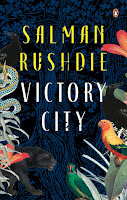Saturday
by Ian McEwan
Henry Perowne, a London neurosurgeon, wakes up before dawn on a Saturday in February 20003. He goes to his window, sees a burning plane land, turns on the TV and discovers that it is not a terrorist attack, goes back to his bedroom, makes love to his wife, goes out for a squash game in the morning, crashes into a BMW while trying to avoid an anti-Iraq war protest in the city, is saved a roughing up by the driver Baxter because he diagnoses Baxter’s neurological disease, finishes his squash game, buys fish at the fish market, visits his ailing mother in an old-age home, attends his musician son’s concert, comes home and makes fish stew for dinner and awaits his son, poet-daughter, poet-father-in-law and lawyer-wife for a re-union dinner. The family re-union is interrupted by a furious knife-wielding Baxter but the day ends with Perowne saving Baxter’s life in an operation theatre. It’s all a Saturday in the life of Henry Perowne.
The plot is deceptively simple. The running track through Perowne’s mind takes us through his unambiguous love for his family to his ambivalence about the Iraq war (he argues for it with his dove-ish daughter and against with his hawkish American partner) and his compassion for and fear of Baxter. It weaves the specific Perowne story with an awareness of the happenings in the world – the growing possibility of the Iraq war, impending terror attacks on London and the war in Afghanistan are never too far away. At its heart, Saturday is a story of an individual’s moral code, executable at a personal level, set against a backdrop of an increasingly uncertain world morality. Henry Perowne is all that is decent in humanity.
McEwan’s language is precise and sharp. You can feel the dry red chillies between your fingers when Perowne crushes them for the fish stew. You can sense the tension in the room when his father-in-law, the famous poet Grammaticus, trashes his 19-year old daughter Daisy’s award-winning poem. And you can feel for Perowne when he describes the dismantling of his mother’s house when she has to be taken to a home. Even the medical procedure in the operating theatre is so vivid it’s like being there.
Saturday reads honestly. There is little here that seems false or clichéd. It’s real and complex and true to life. You can imagine this Saturday happening to a similar man in a similar place. And it holds your attention in a way that reality manages to do. It’s a riveting book.



